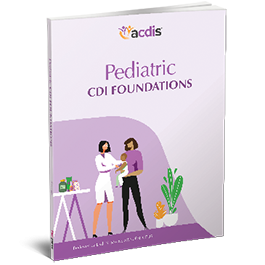This site uses cookies in order to give you the best experience.
We and our third-party partners may use cookies and similar technologies,
for example, to analyze usage and optimize our sites and services, personalize content,
tailor and measure our marketing and to keep the site secure.
Please visit our privacy policy for more information.
Privacy Policy
Pediatric CDI Foundations
$175.00
Product Code:
PEDCDI2^1
| ISBN | 978-1-963512-26-7 |
|---|---|
| DIMENSIONS | 8.5" X 11" |
| Pages | 124 |
| Publish Date | Mar 25, 2025 |
Pediatric CDI Foundations
Reviewed by Leah N. Savage, MSN, RN, CCDS
Pediatric disease processes don’t always mimic those seen in the adult population. This makes expanding CDI reviews to pediatric units or children’s hospitals a challenge, but every challenge is an opportunity.
Previously titled Pediatric CDI: Building Blocks for Success, the newly revised Pediatric CDI Foundations provides an in-depth look at a variety of documentation concerns specific to childhood conditions. Whether you need help securing administrative support from the get-go or want guidance on delving deep into the documentation depths, this book provides the foundational knowledge needed to get your pediatric program off the ground.
A must-read for both new and experienced CDI specialists engaged in pediatric chart review, Pediatric CDI Foundations addresses the following key topics:
-
Basic tenants for establishing a pediatric CDI program
-
Pathophysiology fundamentals for pediatric diagnoses including congenital heart conditions, developmental diagnoses, nutritional and gastroenterological conditions, respiratory conditions, and more
-
Coding and documentation requirements for common pediatric diagnoses
-
Techniques for gaining pediatric physician support
-
Methods for tracking and trending program success
Use this book to expand into the pediatric setting or to take your existing pediatric CDI efforts forward and improve documentation, coding, quality, and reimbursement.
Table of Contents
Introduction
Chapter 1: How to Get Started in Pediatric CDI
- Engaging Administration
- Building a CDI Program
- Program Rollout
Chapter 2: Coding and Payment System Overview
- The International Classification of Diseases (ICD) Code Set
- Considerations Affecting Code Assignment
- Principal and Secondary Diagnosis Selection
- MS-DRGs
- APR-DRGs
- APR-DRG and the Pediatric CDI Professional
Chapter 3: Pediatric Clinical Considerations
- Congenital Cardiac Conditions
- Developmental Diagnoses
- Encephalopathy
- Nutritional Conditions
- Gastroenterological Conditions
- Respiratory Conditions
- Sepsis
Chapter 4: Pediatric Physician Support
- Hospital and Physician Compare Websites
- Building CDI and Physician Relationships
- Providing Resources and Education for Pediatric Physicians
Chapter 5: Metrics and Analysis
- Productivity Standards for the CDI Specialist
- Return on Investment Trends
- Auditing CDI-Initiated Queries
Appendices
- Appendix A—Sample Queries
- Appendix B—White Paper: Developing Pediatric Respiratory Failure Definitions
- Appendix C—U.S. News & World Report Best Children’s Hospitals Measures

